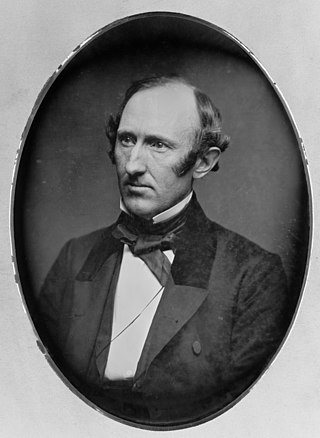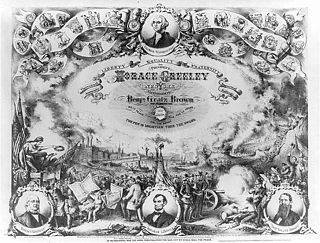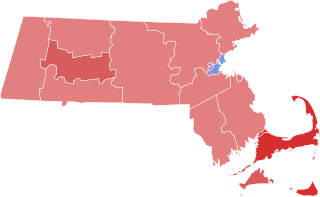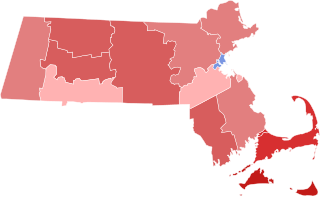
Charles Francis Adams Sr. was an American historical editor, writer, politician, and diplomat. As United States Minister to the United Kingdom during the American Civil War, Adams was crucial to Union efforts to prevent British recognition of the Confederate States of America and maintain European neutrality to the utmost extent. Adams also featured in national and state politics before and after the Civil War.

Wendell Phillips was an American abolitionist, advocate for Native Americans, orator, and attorney.

The Boston Brahmins or Boston elite are members of Boston's traditional upper class. They are often associated with a cultivated New England or Mid-Atlantic dialect and accent, Harvard University, Anglicanism, and traditional British American customs and clothing. Descendants of the earliest English colonists are typically considered to be the most representative of the Boston Brahmins. They are considered White Anglo-Saxon Protestants (WASPs).

Marcus Morton was an American lawyer, jurist, and politician from Taunton, Massachusetts. He served two terms as the governor of Massachusetts and several months as Acting Governor following the death in 1825 of William Eustis. He served for 15 years as an associate justice of the Massachusetts Supreme Judicial Court, all the while running unsuccessfully as a Democrat for governor. He finally won the 1839 election, acquiring exactly the number of votes required for a majority win over Edward Everett. After losing the 1840 and 1841 elections, he was elected in a narrow victory in 1842.

The Liberal Republican Party was an American political party that was organized in May 1872 to oppose the reelection of President Ulysses S. Grant and his Radical Republican supporters in the presidential election of 1872. The party emerged in Missouri under the leadership of Senator Carl Schurz and soon attracted other opponents of Grant; Liberal Republicans decried the scandals of the Grant administration and sought civil service reform. The party opposed Grant's Reconstruction policies, particularly the Enforcement Acts that destroyed the Ku Klux Klan. It lost in a landslide, and disappeared from the national stage after the 1872 election.

William Claflin was an American politician, industrialist, and philanthropist from Massachusetts. He served as the 27th governor of Massachusetts from 1869 to 1872 and as a member of the United States Congress from 1877 to 1881. He also served as chairman of the Republican National Committee from 1868 to 1872, serving as a moderating force between the Radical and moderate wings of the Republican Party. His name is given to Claflin University in South Carolina, a historically black college founded with funding from him and his father.

The Slave Power, or Slavocracy, referred to the perceived political power held by American slaveowners in the federal government of the United States during the Antebellum period. Antislavery campaigners charged that this small group of wealthy slaveholders had seized political control of their states and were trying to take over the federal government illegitimately to expand and protect slavery. The claim was later used by the Republican Party that formed in 1854–55 to oppose the expansion of slavery.
The Massachusetts Republican Party (MassGOP) is the Massachusetts branch of the U.S. Republican Party.

John Phillips was an American politician, serving as the first mayor of Boston, Massachusetts, from 1822 to 1823. He was the father of abolitionist Wendell Phillips.

John Quincy Adams II was an American politician who represented Quincy in the Massachusetts House of Representatives from 1866 to 1867, 1868 to 1869, 1871 to 1872, and from 1874 to 1875.
The Commonwealth of Massachusetts is often categorized politically as progressive and liberal. All of the state’s U.S. representatives and senators are Democrats. Democrats also form the large majority of the state’s legislature, though the state has a history of electing Republican governors. As with most states, the two main political parties are the Democratic Party and the Republican Party.

The Quincy family was a prominent political family in Massachusetts from the mid-17th century through to the early 20th century. It is connected to the Adams political family through Abigail Adams.
The 1871 United States Senate election in Massachusetts was held on January 17, 1871. Incumbent Republican Senator Henry Wilson was re-elected easily to a third term as a member of the Republican Party. Wilson would not finish the term, since he was elected Vice President of the United States in 1872.

The 1876 Massachusetts gubernatorial election was held on November 7. Incumbent Republican Governor Alexander H. Rice was re-elected to a second term in office over former Minister to Great Britain Charles F. Adams.

The 1877 Massachusetts gubernatorial election was held on November 6. Incumbent Republican Governor Alexander H. Rice was re-elected to a third term in office over former Governor William Gaston.
A Massachusetts general election was held on November 4, 1958, in the Commonwealth of Massachusetts.

The 1869 Massachusetts gubernatorial election was held on November 2.

The 1868 Massachusetts gubernatorial election was held on November 3.

The 1867 Massachusetts gubernatorial election was held on November 5.
The 1824 Massachusetts gubernatorial election was held on April 5.



















